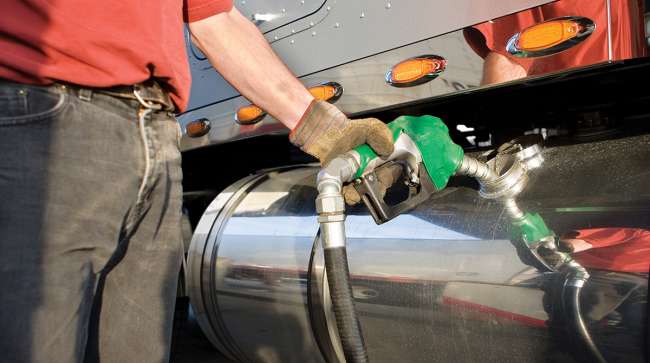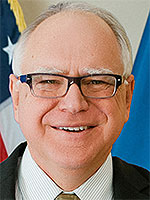Staff Reporter
Amid Disruptions, Midwestern States Issue Regulatory Relief for Fuel Haulers

[Stay on top of transportation news: Get TTNews in your inbox.]
Supply chain challenges have prompted multiple states in the Midwest to extend regulatory relief to truckers who haul fuel.
Governors of Iowa, Minnesota and Nebraska have issued executive orders offering hours-of-service flexibility for truck drivers transporting fuel.
Iowa Gov. Kim Reynolds’ proclamation pertains to crews and drivers hauling diesel, gasoline, ethanol and biodiesel.

Maynes
John Maynes, regulatory affairs manager of FUELIowa, an organization that represents Iowa’s fuel industry, said a number of terminals closed down for maintenance in the state, which challenged transportation patterns for haulers. When a terminal that a driver usually visits closes, that person has to reroute to a different terminal, leading to longer lines and added congestion.
“As these things go, when there are either terminal maintenance or supply outages at terminals, it has a cascading effect in the sense that drivers are dispatched to go find product and that pushes folks into other states, which adds demand on the terminals,” Maynes told Transport Topics.
Iowa Motor Truck Association President Brenda Neville said she has heard from convenience stores that have not been able to accommodate all of their customers on certain days because they run out of gas and haven’t been able to get fuel deliveries. Maynes also noted the economy is “chugging forward,” ramping up demand for fuel.

Walz
Minnesota Gov. Tim Walz’s executive order easing certain HOS regulations for motor carriers providing direct assistance by transporting fuels also cites increased travel and economic activity as reasons behind gasoline demand.
According to Walz’s executive order, fuel terminals across the state, including those located in Mankato, Marshall, Sauk Centre, Alexandria, St. Paul Park, Wrenshall and East Grand Forks, have experienced shortages or outages of fuel products.
“This step will help ensure Minnesotans get the fuel they need at a busy time this summer,” Walz said. “Whether you’re making plans for harvest in the middle of a drought or running a gas station that’s depended on by motorists heading ‘Up North’ and locals alike, we need to make sure Minnesotans have the fuel necessary to get where they’re going and keep our local economies running.”
Walz’s executive order pertains specifically to the provisions of the Code of Federal Regulations that have to do with the overall limitation on work time (60 hours in seven days, for example) and restarting the seven- or eight-day total work time clock.
Minnesota Fuel Transporter Relief Declaration by Transport Topics on Scribd
“I think any time you basically relax the specific requirements of the hours of service, there’s a trade-off there,” Stephen Burks, a professor at the University of Minnesota-Morris who has a background in trucking, told TT. “There’s going to be some level of increased risk because, essentially, the economic incentives for most drivers and firms are to work as many hours as they can. Not everybody does it all the time, but enough people do that you can expect that there will be some increase in risk.”
I think any time you basically relax the specific requirements of the hours of service, there’s a trade-off there.
Stephen Burks, a professor at the University of Minnesota-Morris
In Nebraska, Gov. Pete Ricketts issued an executive order temporarily waiving HOS requirements for truckers hauling gasoline and gasoline blends. Besides refineries shutting down for maintenance, Ricketts’ order mentions issues with the transition from winter gasoline to summer gasoline. According to the U.S. Energy Information Administration, summer gasoline has a lower volatility than winter gasoline to limit evaporation-related emissions that normally increase with warm weather.
The executive orders are scheduled to expire on various dates. Iowa’s order will expire Aug. 28, while Nebraska’s will remain in effect until Aug. 31 and Minnesota’s until Sept. 4.

How much impact does driver pay have in hiring drivers? And what else can fleets do to recruit and retain quality talent? Hear a snippet from DriverReach founder and CEO Jeremy Reymer, above, and listen to the full program at RoadSigns.TTNews.com.
Another challenge with fuel transportation connects to the industrywide shortage of qualified truck drivers. According to American Trucking Associations, the trucking industry needed an additional 60,800 truckers in 2018, a shortfall that is expected to grow to 160,000 drivers by 2028 unless efforts to recruit more people improve.
Walz’s executive order states disruptions to the petroleum markets brought on by the COVID-19 pandemic reduced the size of the labor pool of tank truck drivers. Maynes noted driver challenges were an issue for the industry even before COVID-19 impacted the economy.
“Like the pandemic did for many employers, it was an accelerant to a problem,” Maynes said. “We had drivers retiring and in some cases, like any industry, you had folks who for reasons of their own choosing did not want to work. Our industry’s ability to get product from a terminal to its destination is contingent upon having driver availability.”
Want more news? Listen to today's daily briefing below or go here for more info:





